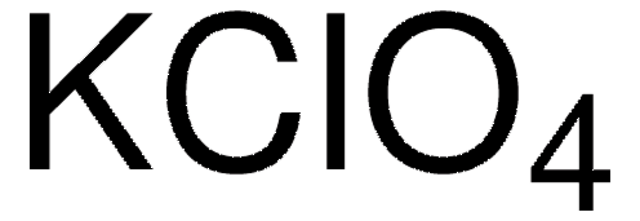About This Item
Recommended Products
grade
ACS reagent
Quality Level
assay
≥99.0%
form
crystalline powder
impurities
≤0.001% N compounds
≤0.005% insolubles
pH
5-6.5 (25 °C, 61.3 g/L)
mp
356 °C (lit.)
anion traces
bromate (BrO3-): ≤0.015%
chloride (Cl-): ≤0.001%
sulfate (SO42-): passes test
cation traces
Ca: ≤0.002%
Fe: ≤3 ppm
Mg: ≤0.002%
Na: ≤0.01%
heavy metals: ≤5 ppm (by ICP)
SMILES string
[K+].[O-]Cl(=O)=O
InChI
1S/ClHO3.K/c2-1(3)4;/h(H,2,3,4);/q;+1/p-1
InChI key
VKJKEPKFPUWCAS-UHFFFAOYSA-M
Looking for similar products? Visit Product Comparison Guide
General description
Application
- In the sequential extraction (SEP) of selenium to analyze its isotopic composition from various Se pools.
- In the preparation of graphite oxide (GO).
signalword
Danger
hcodes
Hazard Classifications
Acute Tox. 3 Oral - Ox. Sol. 1
Storage Class
5.1A - Strongly oxidizing hazardous materials
wgk_germany
WGK 2
flash_point_f
Not applicable
flash_point_c
Not applicable
Choose from one of the most recent versions:
Already Own This Product?
Find documentation for the products that you have recently purchased in the Document Library.
Customers Also Viewed
Our team of scientists has experience in all areas of research including Life Science, Material Science, Chemical Synthesis, Chromatography, Analytical and many others.
Contact Technical Service







